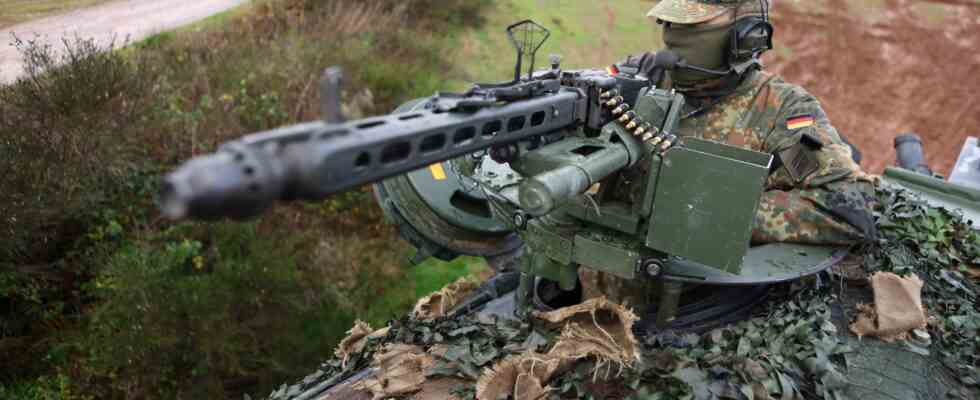Status: 11/27/2022 12:06 p.m
Defense Minister Lambrecht has 100 billion euros available for the modernization of the Bundeswehr. But procurement of new equipment is progressing slowly. Ammunition in particular is urgently needed.
Modern and attractive – this is how the Bundeswehr shows itself in a short advertising film and promises: “We protect Germany.” But many are concerned with the question of whether she is even able to do this. The turning point in history repeatedly invoked by Federal Chancellor Olaf Scholz does not seem to have brought about any major changes for the servicewomen and men.
Complaint about slow procurement
On February 27, Scholz described the challenge that the attack on Ukraine posed for the Bundeswehr: “We need planes that fly, ships that set sail, soldiers who are optimally equipped for their missions. And that is certainly achievable for a country of our size and importance in Europe.”
The Basic Law had to be changed for the 100 billion euro special fund. In addition, the Federal Armed Forces Procurement Acceleration Act was passed at the beginning of July. Months went by. Complaints were repeatedly raised that the responsible defense minister called too little from the special fund, that she was not doing her job justice and that everything was taking too long. On November 23, Christine Lambrecht countered in the budget debate: “You won’t be able to just pull some systems off the shelf in the hardware store, seriously.”
Call for “war economy”
But the question remains whether procurements couldn’t go faster, especially when it comes to the urgently needed equipment for the soldiers – including everyday items, as military commissioner Eva Högl describes: “Helmets, backpacks, protective vests, protection against cold and rain, boots, socks and then the smaller ones Device. The radios are very important. Our radios are 30 years old. That’s why I urge it to be quick.”
But afloat in military procurement is a term that rarely applies. As a rule, many instances have to be overcome. Parliamentary control is central to procurement. But that takes time – despite the new Bundeswehr Procurement Acceleration Act.
That’s why Wolfgang Ischinger, the former chairman of the Munich Security Conference, has thrown the provocative term “war economy” into the discussion, as he says himself. “We cannot continue the Bundeswehr’s normal peacetime procurement process like this,” says Ischinger. “This is to say that the government is prioritizing obtaining the necessary materials.” One must finally realize that “there is a war here. That is why things cannot go on as in normal times of peace”, also in view of the inflation. Procurements from the special fund become a race against time.
Peacetime ammunition supplies
The Department of Defense’s record so far has been mixed: some major projects are underway, such as the purchase of US F-35 fighter jets. But at the same time there is a lack of fundamentals such as the procurement of ammunition. In an emergency, there would only be enough for a few days, warn members of the Bundeswehr.
“We in Germany have prepared ourselves internally not to need large stockpiles of ammunition,” says Sara Nanni, a defense politician for the Greens, describing the situation before the war in Ukraine. That was a misjudgment by all parties. Nanni thinks about the annexation of Crimea. “We should have been on red alert in Germany since 2014. We didn’t take the concerns and fears of Eastern Europeans seriously. Our partners’ perceptions of the threat must play a greater role.”
Six months ago, General Inspector Eberhard Zorn warned that the Bundeswehr was missing ammunition worth 20 billion euros. Many wonder why the ministry didn’t order new ammunition very quickly. “The benevolent explanation is that the ministry has of course been under enormous pressure since the turn of the century,” Nanni admits. “I also see that there is a lot of work being done there. And maybe things didn’t go well with the prioritization in one place or another.”
Race for armaments
The opposition fears that everything could become significantly more expensive – because of inflation, but also because of competition with other countries. “All nations have ordered ammunition in defense technology from the relevant companies and have had to experience that the price for certain things has doubled because the materials and resources are also scarce, and that ultimately determines the price,” says CDU- Budget politician Ingo Gädechens. He therefore assumes that the required ammunition could cost not 20 billion, but even 40 billion euros.
The race for the products of the armaments industry has long since begun. The Federal Association of the German Security and Defense Industry assures that the Bundeswehr should get what it needs, but that the industry needs planning security.
“We can deliver quickly,” promises Managing Director Hans-Christoph Atzpodien, “we are also quite capable of building up capacities. But experience has shown that you have to have an order beforehand. And now just going forward, that would be asking too much.” Atzpodien advocates a unified approach from politics and industry: “We shouldn’t mutually point the finger at anyone, we have to work together to really get this process going.”
Everyone has the opportunity to do so this Monday when a meeting with representatives of the armaments industry takes place in the Chancellery. Above all, a way out of the ammunition misery should be found. How did the chancellor put it again in his speech at the turn of the century? For a country like Germany, with its size and importance in Europe, it must be possible to optimally equip its soldiers.
You can see more on the subject today in the report from Berlin – at 6 p.m. in the first.

